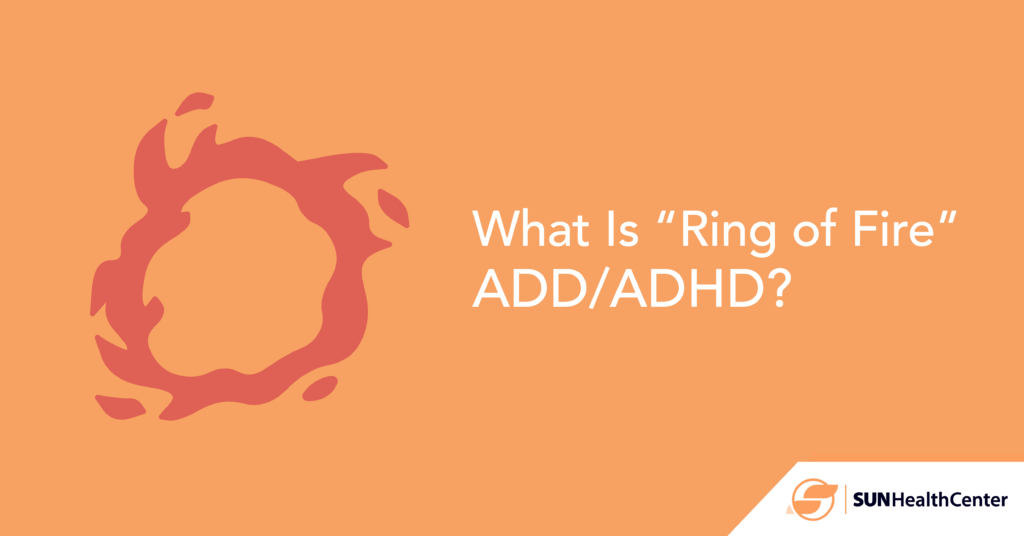
ADD/ADHD is a prevalent concern, and diagnoses are on the rise — particularly among young people. According to data published in the Journal of Clinical Child and Adolescent Psychology, around 1 in 9 children in the United States have received an ADHD diagnosis at some point in their lifetime. Among children with a current diagnosis, around 58% presented with moderate to severe ADHD.
With adult ADD/ADHD diagnoses also trending up and continued research into attention deficit disorders, new insights about variations in the diagnosis are being researched. One such variation is known as “Ring of Fire” ADHD.
Learn more about this variation of ADD/ADHD below, including potential symptoms and treatment options.
What Is ‘Ring of Fire’ ADD?
“Ring of Fire” is a common term used for one of the types of ADD/ADHD. It’s typically considered the most intense form of ADD. Individuals with “Ring of Fire” ADD may have trouble sleeping and experience intense bouts of hypersensitivity, anxiety and irritability.
The 6 Proposed Types of ADD/ADHD
The American Psychiatric Association doesn’t formally acknowledge hypothetical ADD/ADHD types as diagnoses. However, the idea that this condition presents in different ways is commonly acknowledged, and support for typing of ADD/ADHD is growing.
The proposed six types of ADD are:
- Classic ADD. Someone with this type typically has difficulty focusing and may have symptoms such as poor impulse control, fidgeting or excessive talking.
- Inattentive ADD. Individuals with this type of ADD/ADHD don’t always have hyperactive traits, but they do struggle to maintain attention, depending on the situation. Organization is often difficult for individuals with inattentive ADD.
- Over-focused ADD. With this type of ADD, someone may struggle to shift attention from a desirable task to another task, which can lead to intense focus on some things with no ability to focus on others. Other symptoms include obsessive tendencies and anxiety.
- Temporal lobe ADD. Someone with this type of ADD may exhibit mild or moderate aggression and struggle to regulate emotions. Temporal lobe ADD is associated with learning difficulties.
- Limbic ADD. This type of ADD involves low mood, energy and motivation and may look like depression.
- “Ring of Fire” ADD. Outward symptoms of this type of ADD can appear more extreme than they do with other types. An explosive temper, sensory overload and hyperactivity are all common with this form of ADD/ADHD.
How Does “Ring of Fire” ADD Differ From Other Forms?
ADD presents differently in various people, but in general, “Ring of Fire” ADD/ADHD looks or feels more intense than other types. It can also impact brain functions that other types of ADD don’t. ADHD most commonly impacts someone’s ability to manage activity levels and attention; however, “Ring of Fire” ADD can negatively impact your ability to control mood, concentration, memory, organization and emotions.
The reason this type of ADD/ADHD is called “Ring of Fire” is because it can be obvious on brain scans that multiple areas of the brain are impacted. This impact shows up on certain types of scans as a ring of “light” indicating where overstimulation or too much activity is occurring.
‘Ring of Fire’ ADHD vs. Bipolar Disorder
Due to this type of ADD’s impact on emotional control and mood, it can be misdiagnosed as bipolar disorder. The symptoms of “Ring of Fire” ADD, particularly those related to intense hyperactivity, mood swings and loss of emotional control, mimic those that are often demonstrated during the manic phase of bipolar disorder. However, with “Ring of Fire” ADD, the symptoms are more consistent as they don’t come and go with a manic phase.
What Causes ‘Ring of Fire’ ADD?
The exact cause of ADD/ADHD of any type isn’t known. Current thoughts are that the condition may be caused by a wide variety of genetic and environmental factors, especially prenatally. Nutrition issues, exposure to drugs or alcohol and viral infections before birth might increase someone’s risk of having ADD/ADHD.
“Ring of Fire” type ADD may be linked to factors such as infection, allergies, inflammation or mental health conditions, such as bipolar disorder. However, most risk factors and causes are conjecture at this point.
Treatment Options and Management Strategies
An ADD/ADHD diagnosis of any type comes from a licensed mental health professional or clinician. Once a diagnosis is obtained, a health care professional can provide options for treatment and strategies to manage ADD/ADHD symptoms.
Potential treatment options might include:
- Medication. Depending on medical history and individual needs, a health care professional might recommend mood stabilizers to help with emotional dysregulation, stimulants if focus is an issue, antianxiety medications to help overcome ADD anxiety symptoms and other types of medications to address specific symptoms. Medication as a treatment modality requires cautious and consistent oversight by medical professionals.
- Therapy. Talk therapy, including cognitive behavioral therapy, can help individuals identify and work on healthy coping mechanisms to address symptoms associated with emotional dysregulation.
- Occupational therapy. If extreme sensory sensitivities impact someone’s day-to-day function, OT may help address those symptoms.
- Neurofeedback. Neurotherapy can help with brain training that supports a person’s ability to regulate their own activity.
Lifestyle changes can also help someone with “Ring of Fire” ADHD manage their symptoms. Regular exercise can help burn off excess energy that might otherwise fuel aggression, and getting an appropriate amount of sleep each night can make it easier to focus on tasks during the day. It may also be important to avoid stimulants like caffeine, especially in the evening, seek support from your social network and engage in relaxation techniques, such as breathing exercises or listening to music.
Find Out If Neurorehab Can Help
If you’re struggling with intense ADD/ADHD that might be “Ring of Fire” ADD, neurorehab may help. At Sun Health Center, we provide neurotherapy that can help improve brain function and address a variety of mental health challenges. Contact us today to learn more about treatment options.
